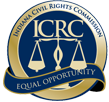Click here to view the ICRC's Mediation Fact Sheet.
ADR
Since 1995 the Alternative Dispute Resolution (ADR) Unit of the Indiana Civil Rights Commission (ICRC) has successfully mediated and conciliated more than 1,000 employment discrimination complaints. Written surveys and verbal feed back received by the mediation team indicate that over 98% of the parties are satisfied with mediation as a fast and efficient alternative to complaint investigation and administrative adjudication processes followed in 80% of the employment discrimination complaints filed with the ICRC.
Successful mediations agreements can include monetary relief but frequently resolution will turn on the equitable, remedial and non-monetary remedies in the agency's jurisdiction. Examples of non-monetary relief that have led to successful resolution of employment discrimination complaints include neutral letters of reference, letters of apology, no retaliatory conduct, withdrawal of the complaint pending with the agency, agreement to adhere to non-discriminatory employment practices or an agreement to provide training to management and staff on equal employment opportunity laws and procedures.
The ICRC enforces the state's civil rights statutes via the determination of probable cause following an investigation, and the prosecution of probable cause complaints before a state administrative law judge. At every stage of the ICRC processes, the commission stresses mediation or conciliation of a discrimination complaint.
To encourage amicable settlements by the parties the Commission provides information about voluntary mediation to all respondents. When a charge is filed, included with the Respondent's Notification of Charge is a brochure describing the mediation process and the benefits of mediation and an Agreement to Mediate form. When the Respondent chooses to try mediation, the form is completed and returned to the ICRC.
After the respondent agrees to mediation, the Complainant is contacted. Nearly, 100% of the Complainants are willing to try mediation. Respondents affirmatively indicate a willingness to attempt mediation in less than 20% of the employment discrimination complaints filed with the agency.
ICRC's ADR Team
From its inception, the ICRC's ADR unit has functioned separately from the investigation and adjudication units of the agency. The commission's ADR unit is devoted solely to mediating charges and conciliating probable cause complaints. At the conclusion of mediation sessions the mediator's notes are destroyed. The unit maintains separate electronic and paper filing systems. This firewall ensures the confidentiality of information gleaned during mediation and conciliation attempts.
ICRC staff mediators have completed a forty-hour mediation course at the Indiana University, School of Law-Indianapolis (IU Law School-Indianapolis). They have also received advanced training in federal and state civil rights laws and remedies and mediation methodology and techniques at the University of Louisville and the Mediation Center of Evansville, Indiana. And, they have attended courses in mediation offered by the National Association of Human Rights Workers, Inc. and Albion Associates, Inc.
ICRC Mediation Methodology
The ICRC's ADR team normally uses facilitative mediation techniques. In facilitative mediation the goal is to focus on a mutually acceptable settlement of the immediate dispute. The mediator does not offer an opinion on the merits of the complaint, but aids in encouraging dialogue between the parties, points out strengths and weaknesses, and guides the parties in settlement negotiations. In appropriate factual situations the evaluative and/or the transformational mediation techniques may be used. In all cases the goal is to achieve substantive, procedural and psychological satisfaction for the parties.
ICRC Mediation Processes
When a respondent agrees to try mediation, the complainant is contacted and a date for the mediation is scheduled. Usually the parties agree to come to the Indiana Government Conference Center in Indianapolis for the mediation sessions. In some cases the mediator will travel to another location and hold the mediation in a neutral place such as a library or the offices of a local human rights commission. Sometimes negotiations are conducted by telephone. When the parties reach an agreement, the mediator will urge them to immediately execute a written settlement agreement. Lap top computers and portable printers are standard tools for ICRC mediators.
On average, an employment discrimination complaint is successfully mediated within 129 days of the complaint's filing. Successful mediation avoids the time and expense of an investigation, which can include responding to requests for production of documents, witness interviews or on-site inspections. Moreover, mediation helps the parties analyze their own interests and results in a no-fault resolution, without a finding on the merits. As a result of the facts and legal standards discussed during the mediation process, even when mediation does not resolve the complaint, all parties are better situated to present their case for a decision on the merits.
Post Probable Cause Conciliation
The ICRC is required to attempt conciliation in all cases where a probable cause finding is issued. A successful conciliation at this stage will preclude the need for pre-hearing conferences, depositions, and an evidentiary trial. In an effort to advance the public interest, conciliation agreements set forth affirmative relief that often requires training of relevant employees and managers, periodic reporting to the ICRC, cooperation with the ICRC monitoring for compliance, posting of appropriate notices of legal rights and enforcement procedures, no retaliation against the charging party or cooperating witness, and adherence to state equal opportunity laws in the respondent's employment practices.
About 65% of the employment discrimination mediations conducted at this stage in the complaint process are successfully settled, usually within 98 days of the probable cause finding.
Mediation of EEOC Cases
During 2003, the ICRC was selected to participate in a national pilot mediation program conducted by the US Equal Employment Opportunity Commission (EEOC). The ICRC and eight other similar agencies qualified and were offered contracts to mediate federal Title Villa employment discrimination charges. ICRC received a contract for 37 charges. The ICRC successfully mediated 27 of the EEOC charges within an average of 59 days and with an average benefit of $6,290.00.
